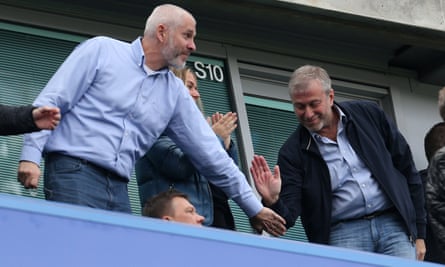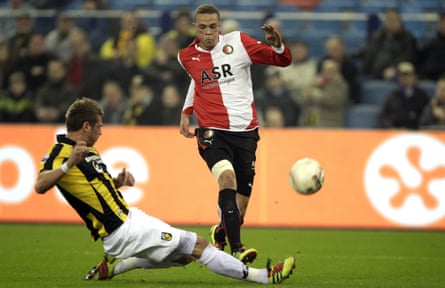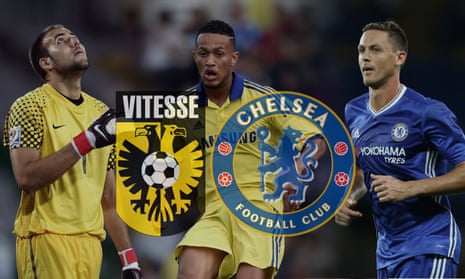It is football’s famously “close working relationship”, framed persistently by questions about how deep the connections go between the Eredivisie club Vitesse Arnhem and Chelsea.
The Dutch Football Association has investigated twice, in 2010 and 2015, finding that although the original funder of the Vitesse purchase and current owner, Alexander Chigirinsky, is a friend and associate of Roman Abramovich, Chelsea’s Russian oligarch owner, there is no common management or ownership of the clubs.
Such a structure would not anyway be against football rules, which permit a person to own more than one club, as does the Pozzo family, owner of Watford as well as Udinese of Italy. Uefa has a restriction to protect sporting integrity, that two clubs in common ownership are prohibited from playing in the same competition. Chelsea and Vitesse have always said they have no formal ownership link, but a series of email exchanges, disclosed as part of a court case in the Netherlands never previously reported in the UK, exposed a much closer relationship than had been revealed publicly.
The emails established that two key Abramovich executives, both holding senior positions in the administration of Chelsea, were centrally involved in executing the Vitesse takeover. Eugene Tenenbaum, who made key decisions over the price for Vitesse and gave the instruction to proceed with the purchase, has been a long-term head of finance and confidant of Abramovich since the oligarch’s company, Sibneft, emerged with vast riches from rigged auctions of state assets in Boris Yeltsin’s deeply corrupt Russia of the 1990s. One of only three directors on Chelsea’s board alongside the chairman, Abramovich’s lawyer Bruce Buck, and the owner’s personal representative Marina Granovskaia, Tenenbaum is described by Chelsea’s own website as “one of Roman Abramovich’s closest associates”.
The other Abramovich executive revealed in the emails to have conducted the takeover of Vitesse in July and August 2010 – carrying out due diligence, appointing Dutch lawyers, reporting to Tenenbaum and seeking approval about the price being paid and the financing details – was Paul Heagren.
He is also a long-term Abramovich lieutenant, secretary since 2002 of the oligarch’s main UK investment vehicle, Millhouse Capital, now renamed MHC (Services) Ltd, whose office is at Stamford Bridge. Heagren has also since 2004 been secretary of Fordstam Ltd, the company Abramovich has employed as the vehicle for the ownership of Chelsea since he bought the club in 2003, and for the £1.1bn loans he has since made to fuel its trophy-seeking signings and wage bill. Tenenbaum is the sole director of Fordstam.
No hint of this involvement by Abramovich’s Chelsea executives was made public when Merab Jordania, the former Dinamo Tbilisi player and Georgia Football Association president, was announced as the new owner of Vitesse following five rapid weeks of takeover activity by Heagren and Tenenbaum on 16 August 2010. The club’s statement declared only that Jordania was the new owner, the “100% shareholder”, and did not mention any other backers, including Chigirinsky. Jordania was quoted saying only: “My network is significant and I have very good relations with major international clubs, from which Vitesse will quickly see benefits.”
Immediately, in the remaining two weeks of that summer’s transfer window, Chelsea loaned Vitesse three players. Most notable was Nemanja Matic, the Serbia international and now fixture in Antonio Conte’s team, who stayed a year at Arnhem then was sold to Benfica, before Chelsea bought him back in 2014. The others were the Serbian centre-back Slobodan Rajkovic, and the Croatian goalkeeper Matej Delac who is still officially a Chelsea player although since his signing in 2010 he has spent every season on loan, at a total of eight European clubs including Vitesse.
Delac, now at Royal Excel Mouscron in Belgium, is one of 38 players Chelsea had on loan at the beginning of this season, including three at Vitesse – the youth-team graduate Lewis Baker and the new signings Matt Miazga and Nathan – which have prompted some accusations that rich Premier League clubs hoard valuable talent.
The public face of the Vitesse transformation after Jordania’s takeover was that the Chelsea loans and further signings significantly strengthened the squad, and by the winter of 2012-13, coached by the former Twente player Fred Rutten, they were competing strongly in second place but then fell back to finish sixth. Shortly after that, in October 2013, the club announced they had a new owner to replace Jordania: Alexander Chigirinsky, saying he had been “already a major financial partner of Merab Jordania” all along.
A few months later, Jordania was out completely. When he left, he suddenly and outspokenly told De Telegraaf newspaper and the magazine Voetbal International that in fact Chelsea had been in control of the club and, Jordania claimed, limited its progress so that Vitesse would not qualify for the Champions League. This has always been denied by the clubs. Since 2010 Vitesse’s fortunes have improved and Chigirinsky, who rarely attends a match, is said to have invested more than €100m, but the club have always fallen short of qualifying for the Champions League, whereas Chelsea have competed in Europe’s elite competition every season since 2010, until this one.
Jordania’s public allegations in 2014 included that during Vitesse’s fine run under Rutten, Chelsea stopped them, at the very end of the January transfer window, from completing a crucial signing to strengthen the squad for an Eredevisie challenge. “We had the feeling we needed one more player to win the title, [the Dutch right-back] Kelvin Leerdam,” Jordania said. “The transfer seemed to be a done deal when all of a sudden ‘London’ intervened. We were not allowed to be too strong. There was nobody in London who hoped Vitesse would become champion or would qualify for the Champions League.”

Leerdam did sign in the summer of 2013, but Jordania claimed that he was forced at the same time to weaken the squad fundamentally by selling Wilfried Bony to Swansea. The striker had enjoyed outstanding form in 2012-13, scoring 31 goals in 30 Eredevisie appearances for Vitesse; Jordania said he had wanted to keep him for six months, but claimed that Bony “had to be sold”.
Then in the summer of 2014, Marcell Ham, a Dutch entrepreneur who had acted as Jordania’s representative in the negotiations to buy the club from the previous owner then stayed on as a director, brought a legal case against Vitesse in the Netherlands. Ham claimed he was owed commissions on the sale of players, but lost his lawsuit because his contract with Vitesse had been signed by Jordania, the owner of the club, not a director.
As part of the case, Ham produced the email exchanges between Tenenbaum, Heagren and Jordania, revealing for the first time the involvement of the Chelsea executives in Jordania’s takeover. The first email was on 22 July 2010, when Heagren wrote to a lawyer, with the subject title “new project”, asking if he had a branch in the Netherlands, preferably Amsterdam or Arnhem.
“There is a sports club purchase that we are helping with in Holland that might go ahead in the next week,” Heagren informed the lawyer, telling him that the fees would be paid by “our associated [sic]”.
Heagren was reporting to Tenenbaum, who is the managing director of MHC (Services), the former head of corporate finance at Abramovich’s formerly state-owned Russian oil company Sibneft, and a director at Stamford Bridge since Abramovich plumped for Chelsea as his chosen football venture. On 24 July 2010, Tenenbaum emailed Heagren to tell him: “Let’s get the legal team ready for the Dutch club.”
Heagren emailed the lawyers the next day, telling them: “We have an agreement on price for this purchase, so I will contact you Monday morning to give you some details so we can prepare a draft contract.”
Tenenbaum suggested to Heagren, who was negotiating directly with Vitesse’s then owner, the Dutch businessman Maasbert Schouten, how the deal should be structured: €6m on completion, with another €2m over two years if certain conditions were met.
On 29 July 2010, Heagren emailed Jordania to tell him: “I will return to London this evening and coordinate the purchase agreement from there, and I may come back to Arnhem early next week.” He asked Jordania for references and evidence to explain his “source of income or wealth”.
Later the same day, Heagren reported to Tenenbaum, copying in Jordania, to say he had finished carrying out due diligence on Vitesse’s finances, and discussed “creating the correct structure” for the takeover of Vitesse, including for tax purposes. Tenenbaum asked in reply: “What is needed to confirm source of funds. It will be a loan from an offshore company.”
Heagren then sent Jordania a draft letter to sign, informing the Dutch football league of the purchase, explaining Jordania’s credentials as a football man, saying he was going to buy 100% of Vitesse via a holding company, and that his aim was “to bring financial stability to a football club with a great history and tradition to enable it to continue its core principles of success through youth development”.
Two weeks later Heagren wrote to Tenenbaum, copying in Jordania again, to say he had had several conversations with the Dutch league, which was satisfied with the information it had. Heagren said: “We can proceed with the transaction … There is no reason not to proceed … Can you please give the OK to proceed as planned.”
Tenenbaum had a further query, which Heagren answered, then at 12:15pm on 14 August 2010, Tenenbaum emailed Heagren, copying in Jordania: “OK. Let’s proceed to closing then.”
Two days later, on 16 August 2010, Vitesse made its official announcement that the club had been taken over by Jordania. The intention, the statement said, was for Vitesse to be “champion of the Netherlands within three years”.
The announcement mentioned Ham having approached Schouten first on behalf of Jordania on 11 July 2010, but did not mention anybody else having been involved in the deal.
A week later, the emails show that Heagren wrote to a Russian lawyer, Alexey Abramov, with the subject heading, “Marindale loan”. Heagren told him: “Now the deal is concluded the borrower is getting a lot of questions from the Dutch league as to the independence of the transaction and with respect to the loan … We think it might help if we could show [only if asked] a letter of ‘support’ such as the one attached. It clearly does not change the terms but may give everybody a bit more comfort over the whole structure.”
Attached was a letter headed Marindale Trading Limited, signed by Ledra Directors Ltd, which appears to be an administration company based in Nicosia, Cyprus. The letter, dated 25 August 2010, was written as confirmation to Jordania’s Dutch holding company, that Marindale was lending it the money for “the purchase of BV Vitesse by the borrower”. Another letter in the documents disclosed by Ham was from Jordania, referring to the loan facility from Marindale having been €20m, giving an address for Marindale as a PO Box in Tortola, in the British Virgin Islands tax haven.
Already by then, the first three Chelsea players – Matic, Rajkovic and Delac – were on their way to Arnhem.
On 6 September 2010, Jordania wrote to Tenenbaum: “As you are aware, Paul [no surname] is visiting Arnhem on Tuesday [you know I met him in London and talked about our future cooperation, about new structure, supervisory board, transfers etc] but feel uncomfortable talking with him just on behalf of me.
“1. Can I talk with him and mention that this is our joint project?” Jordania said.
“As we know our project is a specific one. I strongly believe that it might be successive [sic] for FC Chelsea and profitable and successful for the Vitesse Football Club as well. This is possible with clever scouting and transfer policy.”
Tenenbaum replied: “Thank you. Let’s discuss Paul’s involvement. Regards Eugene.”

In November 2010 the Dutch FA chairman, Bert van Oostveen, wrote to Uefa saying that the acquisition of Vitesse had been investigated for its links with Chelsea. He explained that Marindale Trading, formed on 14 July 2010 in the BVI, had “made it possible for Mr Zhordania [his spelling of Jordania] to get the necessary financial means to buy Vitesse”.
Van Oostveen’s letter went on: “Through a web of companies a connection can be made with the company ‘Snegri Development’. Snegri Development is a company of the brothers Tsjigirinski [his spelling of Chigirinsky], of which Roman Abramovich owns 16% of the shares.”
Sources close to Abramovich have confirmed that he did have a share in Snegiri, the Chigirinsky property company, but that this did not mean Abramovich had any involvement in the Vitesse takeover. Oostveen’s letter concluded: “Details of the financing conditions, including the funds that Marindale Trading Ltd has made available to Mr Zhordania, are not known. This does not provide certainty about the possible managerial influence from Mr Abramovich or the brothers Tsjigirinsky.”
Questions about Chelsea’s links with Vitesse erupted again when Jordania left and made his public allegations of direct interference by “London”, and Ham produced the emails to the court. The Dutch FA then announced another investigation, which finally reported more than a year later, on 22 December 2015. Having appointed the Dutch forensic investigator Integis, to whom it said Vitesse had provided share documents, agreements, financial detail and minutes of meetings, the Dutch FA said in a statement: “From various interviews and other material available the investigation concluded that there is no evidence that Chelsea had control in the policies of Vitesse. The investigation revealed that there is no written partnership agreement established between the clubs, but Chelsea and Vitesse cooperate in some areas, such as the hiring of players.”
Jordania, despite his outspoken public complaints of interference and documented involvement with Tenenbaum and Heagren in the original takeover, had not cooperated with the investigation. He also declined to be interviewed by the Guardian. Stef de Bont, the journalist at Voetbal International who first reported the emails, says the Dutch FA never contacted him. Ham is also understood not to have been contacted. Asked if the investigators examined the emails which documented the extensive involvement of Abramovich’s Chelsea executives in the 2010 acquisition of Vitesse, the Dutch FA did not respond.
Rutten, speaking on the telephone, said that he had been “surprised” in January 2013 when Vitesse suddenly did not sign Leerdam after the player had been lined up, and said he was told from within the club that Chelsea had stopped the signing, but had no evidence. Rutten said he left Arnhem, after one enjoyable year, because it was clear to him their prospects were restricted. “Sometimes you have good feelings, sometimes not such a good feeling,” he said. “I wanted to stay at a club which would grow, but I saw it would take a long time. When I left they sold Bony and [Marco] van Ginkel [the midfielder Chelsea bought for £8m in the summer of 2013 and have since had out on loan]. I thought it was difficult to take them to the championship.”
Vitesse Arnhem did not respond to questions about the relationship with Chelsea, the involvement of Heagren and Tenenbaum in the original takeover, Chigirinsky’s motivation for being involved, the extent of his financial investment, or his infrequent attendance at matches.
Chelsea have always denied any formal link between the clubs, or that they influenced Vitesse not to qualify for the Champions League in 2012-13, as Jordania alleged when he left the club. In response to questions about the involvement of Tenenbaum and Heagren in the takeover, the 2010 emails, Abramovich’s connection to Chigirinsky and the links with Vitesse, Chelsea said only: “We enjoy a close working relationship with Vitesse Arnhem, as we do with other clubs.”
Chelsea sources suggested that it was Alexander Chigirinsky’s own initiative to become involved in buying Vitesse, at first backing Jordania, then becoming the owner himself, and that he had naturally asked Abramovich, as his friend, for help. So Abramovich provided the expertise of Heagren and Tenenbaum to assist Chigirinsky, working with Jordania.
Once Vitesse had been acquired, Chelsea then saw the Eredivisie as an ideal environment for the further development of their own young players, who have since either stayed out on loan for years, been sold with their value enhanced, or, in a minority of cases, made it to the Chelsea first team.
Those in charge at both clubs are emphatic that they are not in common ownership, nor does Chelsea exercise any managerial control. This is, we are told, all just a story about how modern football works.
